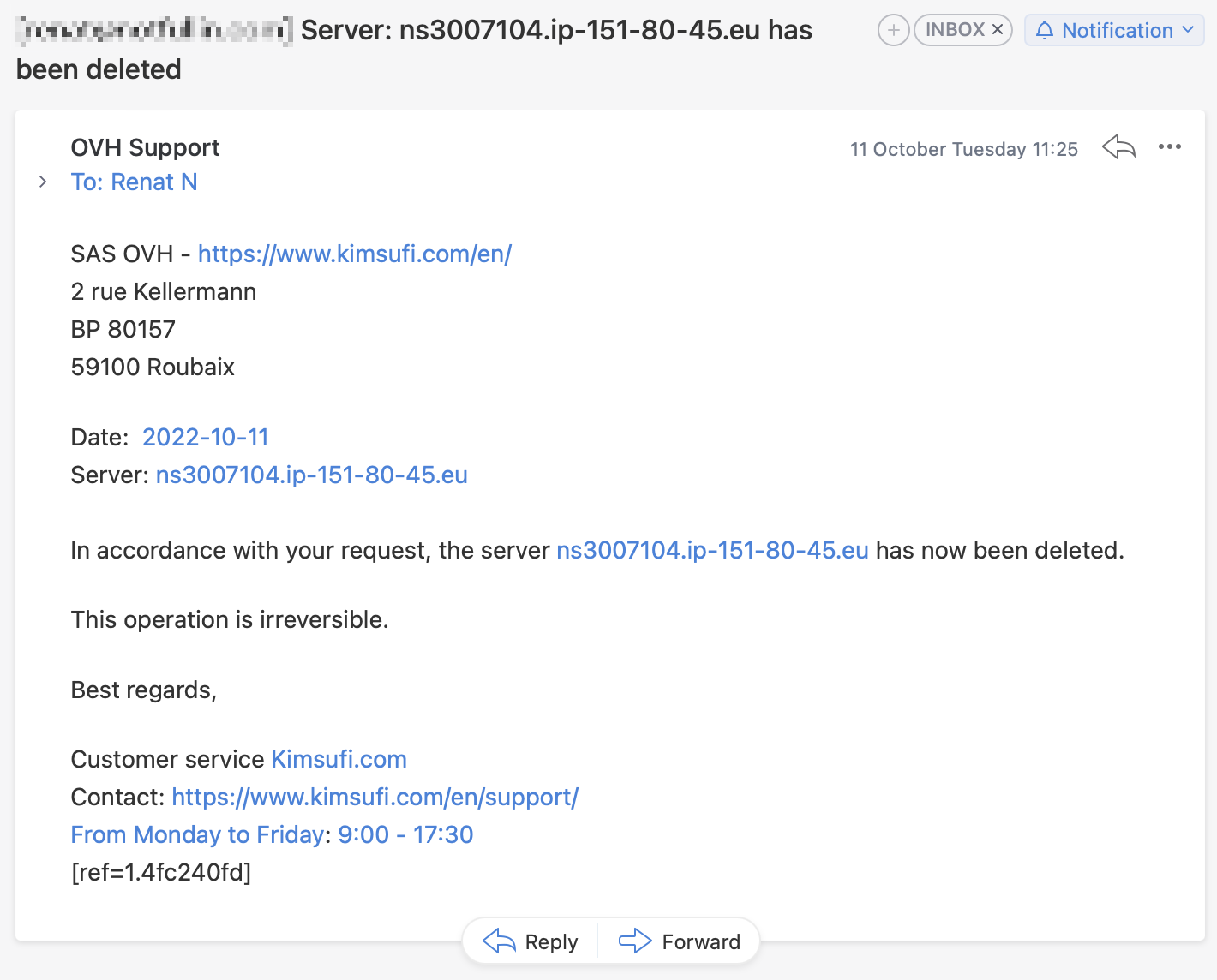🌚 Kimsufi suddenly deleted my server
How it started
8 years ago I came across a low-budget server provider Kimsufi (by OVH) with extremely low prices for dedicated servers, starting as low as 5€/month. Five. Euros. Per month! For a dedicated server! Sure, they were selling those servers like hotcakes and it was hard to order one as they ran out in minutes. I had to set up an automatic page refresh in my Google Chrome to catch the free server. Those Intel Atom-based 5-euro-servers weren’t blazing fast, but their performance was enough to host some simple projects and even run virtual machines. So I moved all my sites and projects to this new server.
How it was going
A couple of years later, I ordered a much more powerful Kimsufi Intel Core i5 server for 16 €/month. And it worked very well since then. It hosted my page, this blog, my ownCloud, some bots for Telegram messenger, my university project with up to 2000 visitors per month, sites for my friends, and more...
How it ended
To keep a Kimsufi server working, a user must pay for the server upfront. I was doing this all 8 years, every month. Sure, sometimes I paid with delay for several days for some unexpected reasons – and these days server was offline. Not pleasant, but quite tolerable for me since I didn’t host any commercial projects on my server.
In October, I have trouble getting paid for reasons beyond my control. While I awaited my money transfer, I haven’t chances to pay for the server. The server was offline this time. I was quite sure that the server is “safely disconnected” from the global network, as many times previously... But it was not there. On October, 11, I received this ‘chain letter’, that my server has been deleted by my request (very interesting wording – of course, I didn’t request the server deletion. They just didn’t bother to make a different notification for that):

To be understood, I received 2 notifications:
- 4th of October – payday,
- 11th of October – postfactum notification about server deletion.
Between these days – 0 notifications, including last-time warnings, that server, and all its data are about to be wiped. Thus, I can suppose, that the payment grace period is 7 days or so. And yes, this information was not transparent at all – at least, it can’t be found either in the previous messages or in the account interface.
Is it my mistake?
It depends. Sure, as a customer, I must pay for services in a clear time frame. But what is this time frame? Was it clear? I’m not sure. Should a hosting provider warn before destroying the server with all data? Probably, yes. Looks like it’s a common courtesy to provide service with transparent terms.
By comparison, this is how many warning messages I got from Vultr since the last invoice that couldn’t be paid automatically:

How many messages did I get between payday and server deletion by Kimsufi? Saying it again – zero.
This approach sucks even if you provide low-budget solutions
I have a bad feeling, that this behavior is not a product mistake. Kimsufi is positioned as a super-low-budget solution in opposition to the parent company – OVH or even So You Start provider. I can’t be 100% sure, though, since I never tried these providers and will never do it now. But this is the only logic I can use to logically explain everything here:
You want friendly service? Oh, sorry – friendly service is not included in our low-budget solution. You could probably try our more expensive servers to get a better experience
Kimsufi was my friend for more than 8 years. As it turned out, the price of our friendship is 16 euros overdue by 7 days.
What I learned
Make backups. Always. Regularly. Your data does not belong to you until you host it on your own server in your own data center.
Unfortunately, some of my backups were too old. Others were missed. But I restored this blog and my personal page, and now I’m going to restore my university project and my friend’s sites. This will be an interesting and thorny journey, but this time Internet Archive, old backups, and forgotten experience with setting up old CMS will be my friends. 🚀
